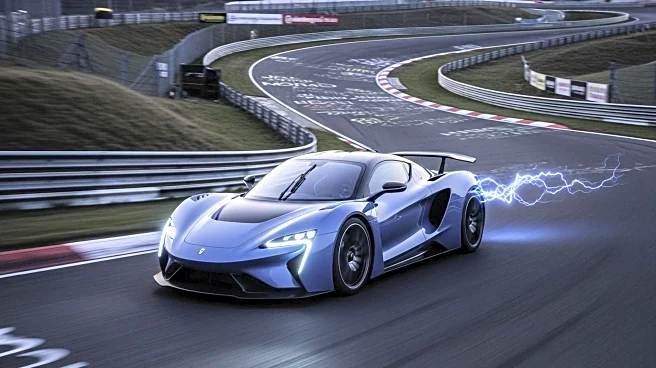What's Happening?
Porsche has introduced a hybrid version of its 911 Turbo S, showcasing significant performance enhancements. The vehicle, equipped with a 701 horsepower engine and advanced aerodynamic features, achieved a lap time of 7:03.92 at the Nürburgring Nordschleife. This marks a 14-second improvement over its previous record. The car was driven by Porsche factory driver Jörg Bergmeister and featured safety modifications such as a roll cage and containment seat. The Turbo S utilizes a 'T-Hybrid' powertrain, similar to the 911 Carrera GTS, with electric turbochargers that enhance boost pressure and energy recovery. The vehicle also includes updated active aerodynamics and a hybrid system integrated with its Dynamic Chassis Control.
Why It's Important?
The introduction of the hybrid 911 Turbo S represents Porsche's commitment to integrating hybrid technology into high-performance vehicles. This development could influence the automotive industry by setting new standards for hybrid sports cars, combining everyday usability with exceptional speed. The impressive lap time, despite not being the most track-focused model, highlights the potential for hybrid systems to enhance performance without compromising practicality. This advancement may encourage other manufacturers to explore similar technologies, potentially leading to broader adoption of hybrid systems in sports cars.
What's Next?
Porsche's continued innovation in hybrid technology suggests further developments in their vehicle lineup. The success of the Turbo S may lead to more hybrid models, possibly influencing market trends and consumer preferences towards hybrid sports cars. Automotive enthusiasts and competitors will likely monitor Porsche's advancements closely, potentially prompting rival manufacturers to accelerate their own hybrid technology initiatives.
Beyond the Headlines
The hybrid 911 Turbo S could have implications for environmental sustainability in the automotive sector. By integrating hybrid systems into high-performance vehicles, Porsche is contributing to reduced emissions and improved fuel efficiency. This aligns with broader industry efforts to address environmental concerns while maintaining performance standards. The move may also reflect changing consumer attitudes towards eco-friendly technologies in luxury and sports vehicles.









